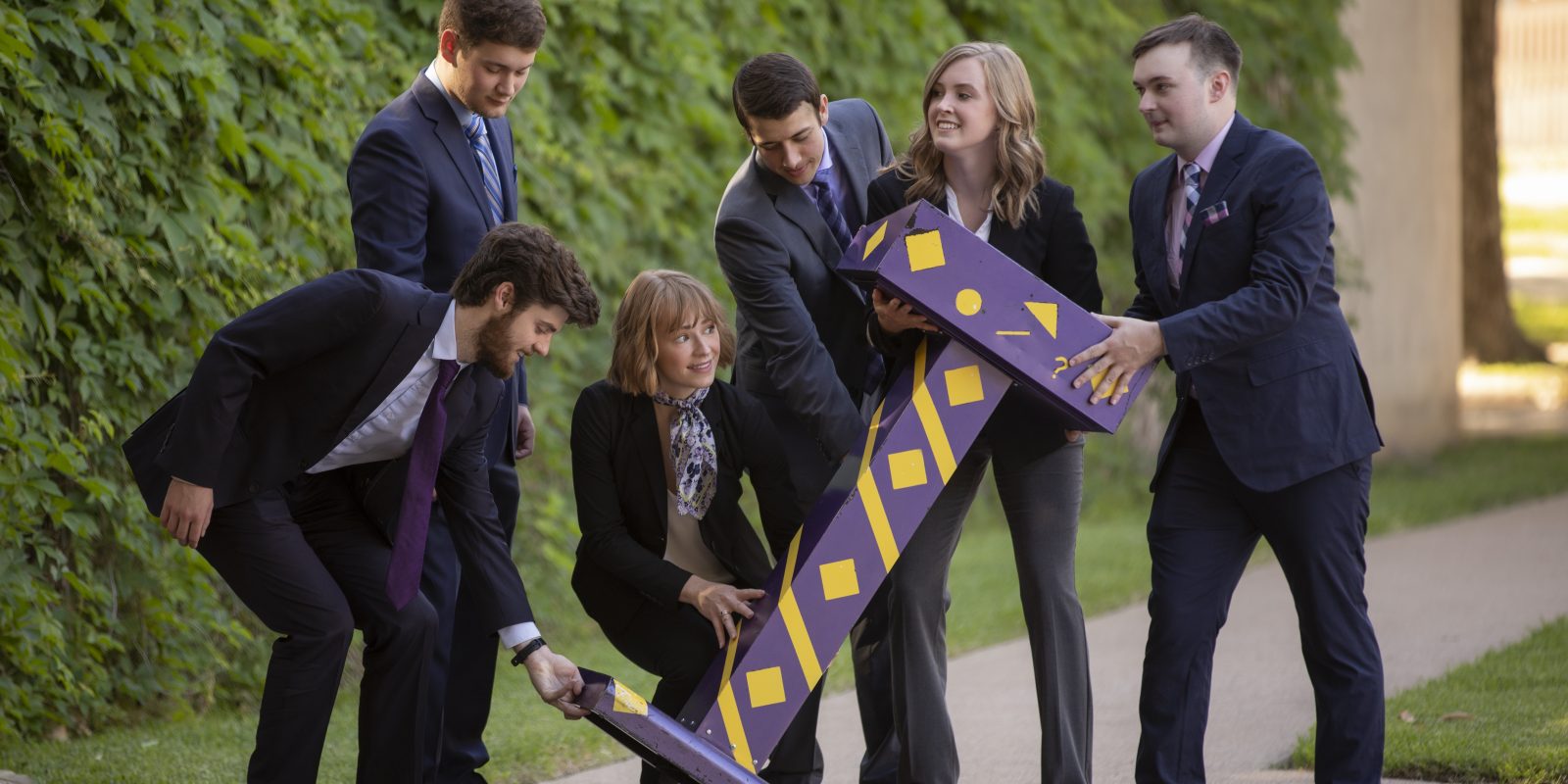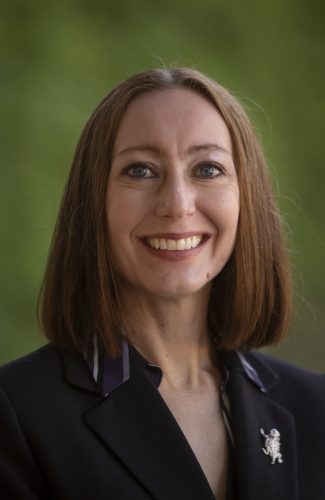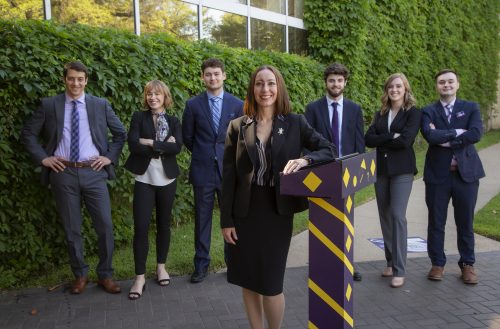
Photo by Joyce Marshall
TCU Debaters Leverage Critical Thinking Skills to Form Winning Arguments
Speech and Debate team members evaluate defenses and form educated opinions.
Should the U.S. use public funds to build a border wall? Create term limits for members of Congress? Take substantial action against Mexican drug cartels? Send troops to Syria? Maintain membership in the Paris Agreement on climate? Forgive all student loan debt?
The issues that have world leaders and political pundits locked in argument are fair game for the 14 members of TCU’s Speech and Debate team. Topics in their tournaments can range from foreign policy and global economics to police reform, vaccination mandates, economic disparity and a host of other contemporary social issues.
Learning the finer points of controversy gives students knowledge about issues with worldwide implications. Debaters also practice the art of evaluating an argument to form an educated opinion. That ability is an important tool for anyone, said team leader Amorette Hinderaker, TCU’s convener of debates and an associate professor of communication studies.

After a hiatus of nearly two decades, TCU’s Speech and Debate program was revived in 2013 under the direction of Amorette Hinderaker, convener of debates and associate professor of communications. Photo by Joyce Marshall
“I don’t think there’s anything like debate that forces you to see both sides of an issue,” she said. “Beyond what you personally believe, you have to be able to articulate an argument for either side. There’s nothing more valuable for understanding the other side’s opinion.”
Free Speech
During a preparation session for a spring 2021 tournament in Denver, debate partners Courtney Parks, a junior biology major, and Sarah Douglass, a junior educational studies and Spanish major, raced through information to form an argument against regulating free speech.
The stance was not about personal preference. The argument was the team’s assigned position in a debate about the topic, “When in conflict, regulating false speech ought to be prioritized over freedom of speech.”
In the 15 minutes given debate teams after they learn of their assigned subject and position, students must formulate an argument by gathering substantive evidence. They then must create rhetoric to fortify the prescribed position.
“If there’s conflict happening, they’re going to argue that we should regulate fake news rather than prioritizing freedom of speech,” Douglass said to her teammate, predicting the opposing team’s strategy.
The students looked up the word regulation in the dictionary. They discussed Facebook founder Mark Zuckerberg’s appearances before Congress and how regulations related to sharing information have been slow to keep pace with the evolution of social media.
“You are free to say whatever you want, but you are responsible for the consequences,” Parks said to her teammate, laying out the crux of her strategy.
Hinderaker joined the team’s preparation room via Zoom for a lightning round of coaching. “Press them on what is false information and what they mean by that,” she told them. “You have a billion examples of how horrifying regulation is for citizenry. They’re going to run harms of disinformation, and you need to run how the harms of regulating speech outweigh the potential harms of misinformation.”
“Beyond what you personally believe, you have to be able to articulate an argument for either side. There’s nothing more valuable for understanding the other side’s opinion.”
Amorette Hinderaker
“People still have the right to access other information,” Douglass concurred.
“We have guaranteed freedom of speech,” Parks said. “However, we are not free from the consequences of that speech.”>
She noted the case of Andrew Wakefield, a former physician in Great Britain who was involved in a 1998 Lancet study that falsely claimed a link between the measles, mumps and rubella vaccine and autism. The study was eventually retracted by the co-authors and the journal, and Wakefield lost his license to practice medicine.
Armed with enough information to make a sound argument, the TCU debaters argued their position against a team from Grove City College. Parks and Douglass made it to the final round of the debate tournament, and Parks is now serving as president of the TCU Speech and Debate team during the 2021-22 academic year.
Communication for Everyone
Each debate student shows up with different skills, talents and goals.
“The big thing for me is the interview for medical school,” Parks said. “I know I can interview well and advocate for myself and speak proficiently — I’m grateful I did speech and debate for that reason.”
The eloquence Parks displayed during the tournament was hard won; she required seven years of therapy to overcome speech issues as a child.
“I’d like to be a compassionate and understanding doctor,” she said. “You look at things like disparities in race and income and gender identity in health care, and you need more compassion, more people who are willing to have a worldly view. Speech and debate truly gives you that.”
Xander Wick ’21, who was president of the TCU Speech and Debate team during the last academic year, said exploring hot topics led him to the activity.

Led by Amorette Hinderaker, center, the TCU Speech and Debate team includes, from left, Kyle Deer, Isabel Dunkelberger, Ryan Debish, Matthew Gill, Sarah Douglass and Logan Gibbs. Photo by Joyce Marshall
“Speech and debate gives you a platform to discover and express your viewpoints on certain things in a very educated and academic manner,” said Wick, who finished sixth in Parliamentary Debate at the Pi Kappa Delta National Tournament in March 2021.
“I feel like so much of debate — especially in the 21st century — is on Facebook and Instagram, where there is so much misinformation. [In debate] we practice and teach people how to develop educated arguments. We explore the research to create a viewpoint.”
Creating an argument is a skill, Hinderaker said, but evaluating one is another.
“We also learn how to pull apart an argument,” she said. “My kids are able to understand fallacies of reasoning. They can tell you what’s at work in the argument and give you reasons to question that information.”
Understanding reasoning and logic is essential to being a discerning consumer of information, she said. But it takes effort. “It’s easier to just look at some cute, funny meme that someone posts and go with that.”
Critical thinking skills acquired through speech and debate are useful in any career path, Hinderaker said. Pre-law students compete alongside people majoring in education, finance, political science, communication, biology, engineering and more.
Team Spirit
The team meets weekly — more often when a tournament is coming up — and members can spend up to 20 hours a week in preparation, Hinderaker said. The team typically competes in both speech and debate but decided to focus exclusively on debate during the pandemic.
“Speech and debate gives you a platform to discover and express your viewpoints on certain things in a very educated and academic manner.”
Xander Wick
The TCU team had planned to host a national tournament in spring 2021 and bring more than 100 collegiate debate teams to campus. The pandemic necessitated a transition to an online event.
“Competing online has been crazy,” Wick said, “but the whole team has pulled together.”
During tournaments, the team prepares together. They call on one another to share information and gain as much knowledge as possible about their assigned argumentative position in the short window they have to formulate a strategy.
“The team knows that as soon as they get a resolution that reads nuclear power or NASA, they’re asking me,” Parks said. “If we get a topic on cryptocurrency or the stock market, we need Xander. And if it’s sports, we’re asking Ryan [Debish] and I’m like, ‘Ryan, what’s a field goal?’ Sarah knows so much about child education and development, and she also speaks Spanish.”
TCU competes in tournaments sanctioned by Pi Kappa Delta, the oldest forensics honor society for undergraduate university students and a professional organization for speech and debate coaches. TCU joined the organization in 2013 after Hinderaker was hired by the Bob Schieffer College of Communication in 2012 to resurrect speech and debate at TCU. The program had been on pause at the university since 1977.
Ryan Louis, associate professor of communication studies and director of forensics at Ottawa University and president of Pi Kappa Delta, lauded Hinderaker’s guidance of the program. TCU students regularly earn Top 10 finishes in national competitions. This year’s team is working toward the national tournament in Orlando, Florida, in March 2022.
“I am excited for the leadership Dr. Hinderaker and her team offer on important conversations that seem so eruptive in our nation today,” Louis said, pointing to “the role of facts, the necessity for engaging problems cooperatively to solve them and, ultimately, the ability to empower students to find their own voice in a world so full of babble.”

Your comments are welcome
Comments
Related reading:
Research + Discovery
Amiso George Blends Culture and Crisis Communication
The professor has studied training and strategy on several continents.
Alumni, Features
Asylum-Seekers Find Solace in DASH Network
The Dallas-Fort Worth nonprofit provides housing as well as support and friendship for people fleeing persecution.
Research + Discovery
Data Breach Warrants Carefully Crafted Apology
When sensitive information gets hacked, Joshua Bentley says it’s important for corporations to iterate four elements.